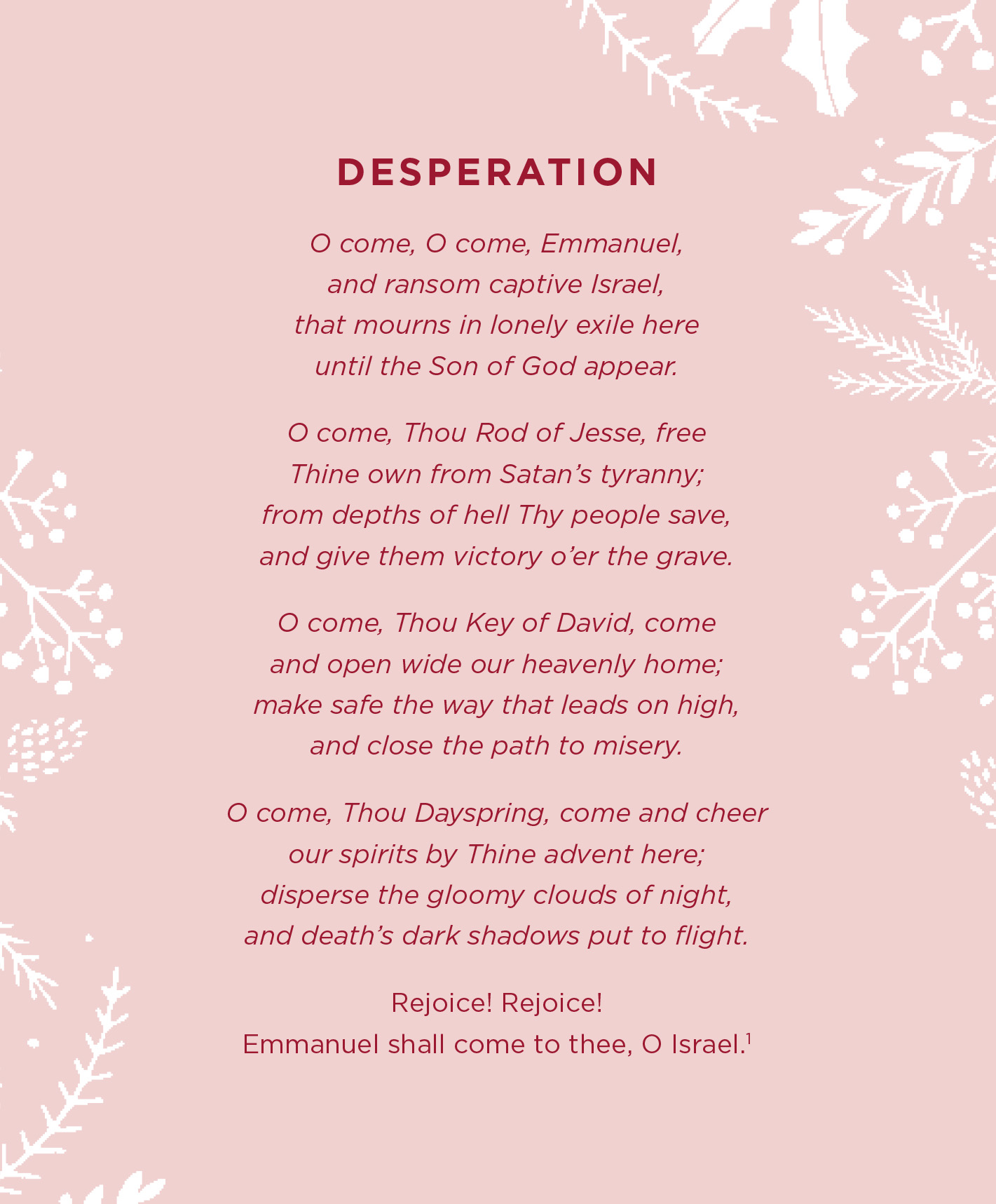Born a Child and Yet a KingSample


Day 2: Unchained Melody
At one time in my life, if I were imagining how to begin an Advent journey through the carols, I might have had difficulty deciding which one to start with. Not anymore. Unsurprising to me now, my new favorite is the oldest (by far!) of them all.
The original Latin text of “O Come, O Come, Emmanuel” can be traced back to the 800s ad, although it wasn’t collected in hymn form until much later. The unknown writer was well-versed in the Old and New Testaments. Each of the song’s seven original stanzas, some of which are rarely sung today, highlights a different title ascribed to the Messiah in Scripture, creating a collage of features and attributes that lead us to worship.
But these titles are more than just names. Each of them tells why He came.
Take the first, for example:
O come, O come, Emmanuel and ransom captive Israel.
Emmanuel, as Matthew notated in his Gospel account, means “God with us” (Matt. 1:23), hearkening back to the prophet Isaiah: “Behold, the virgin shall conceive and bear a son, and shall call his name Immanuel” (Isa. 7:14). (The slight spelling difference here has to do with transcribing the original Hebrew and Greek; it does not change the meaning of the name.)
God with us, not just over and above us.
God with us, not off at a distance, forever beyond us.
But why would we want Him so near us? Would we not, like Adam hiding in the garden, prefer to have Him far from us? Isn’t that our nature—to duck from His gaze? To run toward shadow and seclusion? To avoid being found—or found out?
Not when we’ve finally seen our sin for what it really is—a trap. Not when, like Israel taken captive into Babylon, the confining walls of our own making have closed in on us. The bondage has become inescapable. Our dark nights have begun to howl with the loneliness of separation. We’ve realized, through the unforgiving lens of personal experience, that Jesus was right, that “whoever commits sin” is in reality “a slave of sin” (John 8:34 NKJV).
And we want out. We want to be set free.
O come, O come, Emmanuel and ransom captive Israel.
This is a hymn of longing—of Israel’s longing for their Messiah, for a rescuer, for a deliverer who would come and set them free. They longed to be back in their homeland, back to their temple, back to the things they’d taken for granted during those years when God had pleaded with them to return to Him, warning them of what their continual compromises with evil and idolatry would surely cost.
We sing His name—Emmanuel—because of how we ourselves came to this earth, not with sins that we could learn to overcome if we worked hard enough, but with sins that had already defeated us, destroyed us, doomed us. And this is how we would die—in eternal captivity—if not for “God with us.”
If not for the coming of Emmanuel. If not for Christmas.
Prayer
Father, thank You for hearing us when we cry to You, for not abandoning us in our captivity to sin, the past, or anything that has kept us apart from You. Help us realize today, whenever we feel chained to old taskmasters and tyrants, that You have already done all the work to set us free forever. May we live every day knowing our Deliverer is here: God with us.
Keep Reading
Nehemiah 1:6–10
“. . . though your outcasts are in the uttermost parts . . .” (v. 9)
Psalm 22:1–5
“To you they cried and were rescued.” (v. 5)
Ephesians 2:13–19
“You are no longer strangers and aliens.” (v. 19)
Consider
When in your life have you felt the most trapped and confined, held down from being free to serve your Lord the way you truly desire? What difference does it make that Emmanuel—God with you—has come?
About this Plan

6 Advent Readings by Nancy DeMoss Wolgemuth
More
We would like to thank Moody Publishers for providing this plan. For more information, please visit: https://www.moodypublishers.com/BornAChildAndYetAKing/?utm_source=YouVersion+Devotion&utm_campaign=AT_Born+a+Child_YouVersion
Related Plans

Rising to New Heights With Your Shepherd-King 7-Day Plan
![[Giving Jesus Away] to Seek and to Save](/_next/image?url=https%3A%2F%2Fimageproxy.youversionapi.com%2Fhttps%3A%2F%2Fs3.amazonaws.com%2Fyvplans%2F55091%2F320x180.jpg&w=640&q=75)
[Giving Jesus Away] to Seek and to Save

Colossians
Charis Bible College Summer Bible Reading Plan

The Cost of the Kingdom

Be Thankful

7 Days of Prayer for the UK

The Forgotten Teachings of Jesus
